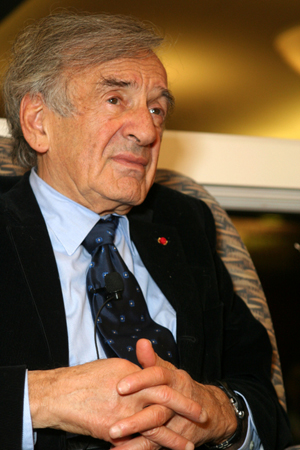First of Three Encounters with Elie Wiesel Tonight
Bible’s Deborah, judge and prophet

They fuel our passion for learning and they “seem strangely topical,” says Elie Wiesel of the Jewish tales that serve as springboards for his annual trio of free public lectures at BU. Wiesel (Hon.’74), BU’s Andrew W. Mellon Professor in the Humanities, begins this year’s Fascination with Jewish Tales series, a fall event since 1975, with the biblical story of Deborah, who, in addition to being an important figure in Israel’s defeat of the Canaanites, was the Old Testament’s only female judge—in this context meaning charismatic leader—and the only judge to be called a prophet.
Thousands of years after they were written, these tales remind us “that we belong to one another,” says 1986 Nobel peace laureate Wiesel, a prolific author and a Holocaust survivor who has devoted his life to human rights struggles around the world. John Silber (Hon.’95), BU president emeritus, will introduce Wiesel at tonight’s lecture. The three lectures, sponsored by the Elie Wiesel Center for Judaic Studies at BU, are on consecutive Monday nights, beginning at 7 p.m., in the George Sherman Union’s Metcalf Hall.
Wiesel says the common theme of the series is “the role of memory.” Rabbi Joseph A. Polak (Hon.’95), director of BU’s Hillel House, also points to the Jewish tales (“I would never call them legends,” he says) as timeless, colorful tools for bringing life to abstract ideas, such as human rights, which “can be the bedrock of society and help us relate to our most important principles.” These stories, he says,“help us to understand our laws, our societies, and most of all, ourselves.”
In the second lecture in the series, on November 1, Wiesel will discuss The Rebbe of Ger: A Tragedy in Hasidism. Prior to the Holocaust, Ger was the largest Hasidic group in Poland; today it is one of the world’s largest Hasidic dynasties. The subject of Wiesel’s talk, Rabbi Yitzhak Meir, was a founder and leader of the movement. Wiesel will be introduced at that lecture by BU trustee Elaine Kirshenbaum (CAS’71, SED’72, SPH’78). His final lecture, on November 8, examines Ethos and Contemporary Issues, and will be introduced by Polak, who notes that stories—ma’aseh in Hebrew—are accepted as precedent in the Jewish laws of evidence.
“In my life I have found that in the end, the only way to teach that is transformative for my students is with stories,” Polak says.
Wiesel would agree. What does he hope people will take away from the three lectures? “A heightened sensitivity,”he says.
All lectures in the series Three Encounters with Elie Wiesel: The Fascination with Jewish Tales take place in the George Sherman Union’s Metcalf Hall, 775 Commonwealth Ave., and are free and open to the public. Doors open at 6 p.m. for the 7 p.m. lectures. Overflow seating is available in the Conference Auditorium. For more information, call 617-353-2238.
Susan Seligson can be reached at sueselig@bu.edu.
Comments & Discussion
Boston University moderates comments to facilitate an informed, substantive, civil conversation. Abusive, profane, self-promotional, misleading, incoherent or off-topic comments will be rejected. Moderators are staffed during regular business hours (EST) and can only accept comments written in English. Statistics or facts must include a citation or a link to the citation.